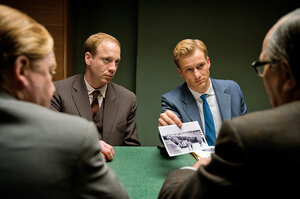'Labyrinth of Lies' is stiff but examines a historically neglected subject
'Lies' is conventional but its story of how the 1963-1965 Frankfurt Auschwitz trials had Germans prosecuting Germans is an important one.

Hans Lichter (Werner Wölbern), Otto Haller (Jo- hann von Bülow), Johann Radmann (Alexander Fehling), and Alois Schulz (Hartmut Volle) tussle over Nazi history in ‘Labyrinth of Lies.’
Heike Ulrich/Claussen+Wöbke+Putz Filmproduktion
Unlike the well-known Nuremberg war-crime trials, the 1963-65 Frankfurt Auschwitz trials had Germans prosecuting Germans. How these trials came about, in the face of both fierce resistance and willful disinterest, is the core of “Labyrinth of Lies,” directed and co-written (with Elisabeth Bartel) by Giulio Ricciarelli. It’s a somewhat stiff and conventional piece of work, but it examines an important, and historically neglected, subject.
Johann Radmann (Alexander Fehling), the film’s main protagonist, is first introduced to us as a new hire in the public prosecutor’s office. (He is a composite of three real-life prosecutors who participated in the Frankfurt trials.) Chafing for more ambitious assignments than handling traffic violations, he forms an alliance with Thomas Gnielka (André Szymanski), a crusading journalist who wants to expose an unpunished ex-Nazi teaching at one of the local schools. (A friend of Gnielka’s, an Auschwitz survivor, is the one who first recognizes the man, who brutalized him in the camp.)
Radmann’s discovery that the teacher was a member of the Waffen SS in Auschwitz stirs little interest among his associates, one of whom tells him: “The public sector is full of Nazis, and none of them has anything to worry about.” Radmann’s righteousness, and seeming naiveté, is mocked by the other lawyers, except for the prosecutor general, Fritz Bauer (the late Gert Voss, the marvelous German character actor to whom the film is dedicated), who encourages him to press on.
What Radmann uncovers, after a mammoth search through the archives of the US Army Document Center, is that thousands of former Nazis returned to postwar civilian life unrepentant and unpunished – as if the entire nation had turned a blind eye to its atrocious past. But because of the statute of limitations on non-capital war crimes, he must first prove murder against those he seeks to prosecute.
Radmann’s growing awareness of the enormity of the crimes he uncovers, corroborated by eyewitness testimonies, leads him to pursue higher-echelon criminals such as Josef Mengele. His prosecutorial zeal becomes obsessive. When he confronts the past of the father of his girlfriend (Friederike Becht), and eventually that of his own father, his self-created identity as righteous crusader is badly shaken.
The film tackles a great subject: How was it that Germany, in the wake of World War II, willfully buried the sins of its past? The subject is far too large for the rather dutiful treatment it receives here. If Radmann had come across a bit less nobly, if his ambition carried more careerist overtones, he might have registered with more complexity. Radmann also glosses over the way American officials, in an effort to forge a cold-war alliance with Germany, also turned a somewhat blind eye to the former Nazis in its midst.
But at least the film brings up a disturbing piece of history without sensationalizing it. And it does believably portray why so many Germans, with the war at last over and the economy beginning to boom, preferred to forget what many claimed they never knew. Grade: B- (Rated R for a scene of sexuality.)

